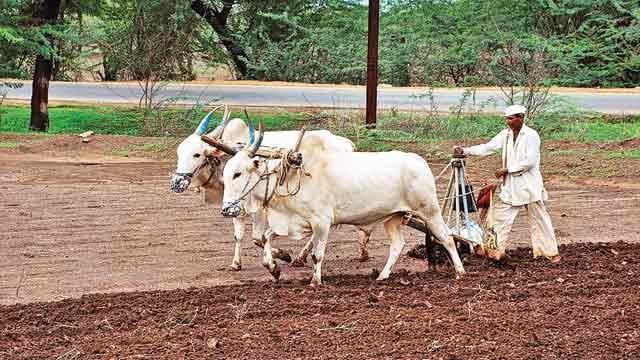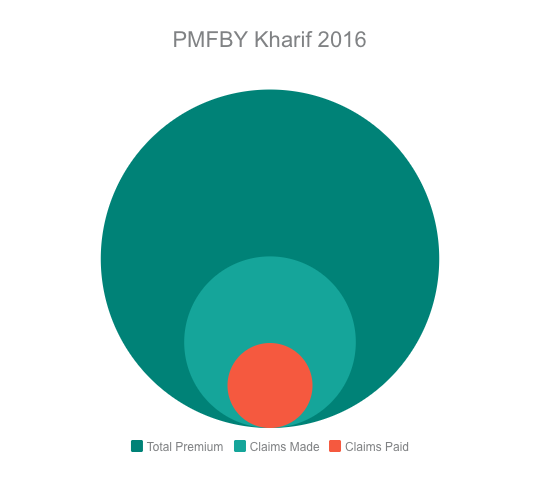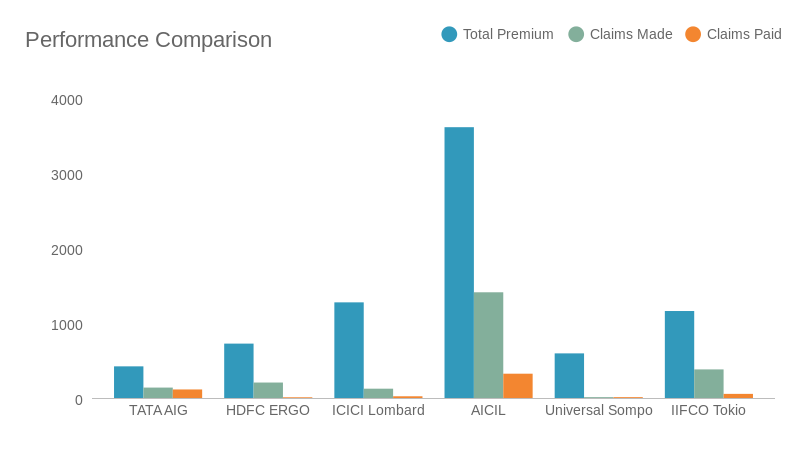The Facade of Fasal Bima Yojana

The Pradhan Mantri Fasal Bima Yojana (PMFBY), the crop insurance scheme designed to compensate farmers in case of crop failure, was rolled out in 2016 with much fanfare and publicity. More than a year after it was implemented, we take a look at the numbers to see how well it has done.
As an earlier report by Newsclick highlighted, the ratio of the amount of premium collected to the amount of claims settled is shocking. Most of the premium collected has gone on to profit the selected insurance companies.
A total of ten insurance companies offered insurance in the Kharif season of 2016, when the scheme was introduced. In the first season itself, a premium of Rs 9.041.25 crore was collected by insurance companies. A total of Rs 2,324.01 crore was claimed in losses, of which only 25% — Rs 570.10 crore — had been paid by March, 2017.

The data that was presented to the Lok Sabha in the beginning of this year had information only from the first season of the Yojana. Six months after the season ended, the data remained incomplete and only a quarter of the insurance claims had been settled. Since then, two more agricultural seasons have ended, but no recent data on the premiums and the claims has been made available.
Only five companies have provided conclusive data, while Reliance General Insurance Company (GIC) has provided no data at all. From a different data set presented in the Lok Sabha, it was seen that Reliance GIC was the only insurance company in Kerala and Tripura, and it collected Rs. 546.64 Lakh in premium from these two states. There would have been additional money collected from farmers, along with the money collected from the other five states which are Assam, Chhattisgarh, Haryana, Maharashtra, and Orissa.

From the available data, it can be seen that AICIL (Agriculture Insurance Company of India Limited) has the highest amount of unsettled claims, followed by IIFCO Tokio, HDFC and ICICI. In terms of gains from the premiums, AICIL has profited the most, followed by ICICI and IIFCO Tokio. Universal Sompo, an insurance company present only in Karnataka, is the sole company that has managed to settle all its claims.
The insurance premiums have been largely paid by the state and central governments. The premium for farmers is fixed between 1.5% to 5%, and any excess over that is paid by the government, split in half between the state and the Centre.
The cost of these premiums is turning out to be quite high for the states. In fact, many state governments have been unwilling to implement this Yojana because of the high costs involved. A huge chunk of the state agricultural budget is now being used only for payment of these premiums to insurance agencies. For Madhya Pradesh, this amount is 60% of the state’s total annual agriculture budget. A Down to Earth report talked about the burden on state budgets for the implementation of the scheme, and the tactics being employed by them to tackle this problem.
For instance, the states of Bihar and Gujarat delayed the notification of the Yojana. Because of this, the sowing period was already over by the time the notification came out, which negatively impacted the number of farmers who enrolled for the scheme voluntarily. Another method used was to reduce the amount of sum insured. According to the rules of PMFBY, the sum insured is calculated on the basis of the scale of finance, which is an estimate of the amount of money that would be spent on raising the crop. However, Rajasthan and Uttar Pradesh violated these rules and reduced the sum insured by changing the way the cultivation cost is calculated. The expected premium for Kharif 2016 in Rajasthan was Rs 1,800 crore. The state reduced the premium to Rs 1,109 crore. In the current budget, Rajasthan has allocated only Rs 676 crore to the Yojana.
It is clear to see that the first season of the Yojana did not do very well. More recent data is awaited to monitor the implementation of PMFBY in different states.
Disclaimer: The views expressed here are the author's personal views, and do not necessarilyrepresent the views of Newsclick
Get the latest reports & analysis with people's perspective on Protests, movements & deep analytical videos, discussions of the current affairs in your Telegram app. Subscribe to NewsClick's Telegram channel & get Real-Time updates on stories, as they get published on our website.























